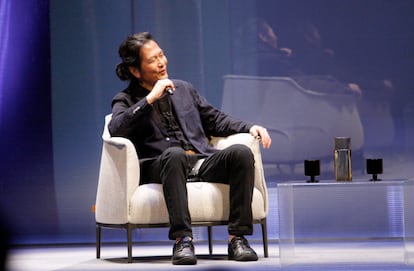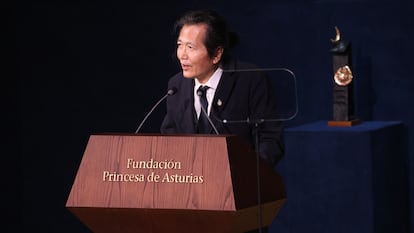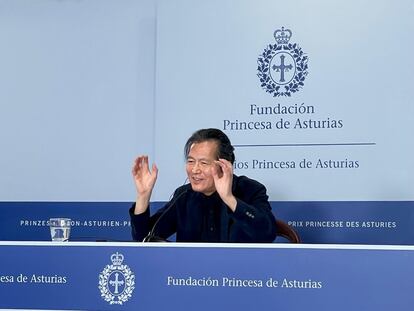Byung-Chul Han (Seoul, 1959) wants to talk about his pianos. He has two: a Steinway and a Fazioli. He also wants to talk about his garden, which he likes to take care of. He wants to talk about the importance of doing things with your hands. “Happiness comes from working with the hands,” he says, “for Heidegger, thought is manual work, for Paul Celan so is good poetry. Without hands, neither happiness, nor thought, nor action is possible.”
Han, the German philosopher of South Korean origin, the thinker who sells books like hotcakes analyzing contemporary unrest, the one they have called rockstar of philosophy, this year she was awarded the Princess of Asturias Award for Communication and Humanities. He feels honored to be the successor of other German thinkers awarded in Oviedo, such as Günter Grass, Hans Magnus Enzensberger and Jürgen Habermas. The key to its success lies in being the receptacle of other thinkers who analyzed the drift of the contemporary world, such as Michel Foucault, Guy Debord or Zigmunt Bauman, and updating this line of thought for an audience that is reflected in its criticism of self-exploitation, hyperconnection, acceleration or the emptiness of our existence in the neoliberal order.
During his journey through Asturias he has only given one interview, and he has not granted it, but has requested it. EL PAÍS went last Friday, the morning before the ceremony, to the Reconquista Hotel in Oviedo, on whose stately carpets award-winning winners, authorities and journalists formed groups, to listen to Han and see his hands: he has fine hands.
Han receives in a section of the hotel, does not allow his voice to be recorded, only notes taken with his hands (although he points out the fact that this journalist types hurriedly on the phone screen and does not use a pen and paper, because he hardly knows how to write by hand anymore) and prefers to speak in German, with the help of an interpreter. This is the reason for his call: the thinker is disgusted with the description that some media have made of him after attending his talks and his press conference (the first he gave in his life, last Tuesday): he believes that they have portrayed him as an ostentatious person, as if he were a frivolous millionaire, due to the mentions of his two pianos and his garden, those elements with which he interacts manually.
“It’s a scandal! I’m not a wealthy man. You don’t get rich with philosophy, especially when it’s so easy to pirate my books. Anyone can easily download them on the Internet. It’s a catastrophe for publishers and authors.” Regarding his pianos, the mention of which could be seen as a display of ostentation, Han points out that they sound good, but are old. The Steinway is around 60 years old, “it is small, but it has a wonderful sound”; Fazioli is also old: he assures that they are not worth much. “Many people read me, but I’m not a millionaire,” he insists.
Perhaps, Han thinks, there has been a misunderstanding about the German word winga polysemous term that means bird’s wing, but also grand piano. “Heidegger also says that thought is elevated by the wing of Eros and that wing allows us to reach a place that no one has yet set foot in, a space that no one has experienced,” he says. Plato, the German continues, also speaks of thought referring to Eros, which brings us the idea of the Good and the Beautiful: that thought is also taking off and flying towards the sky of Ideas. Thus, Han has two pairs of wingthe wings that allow you to fly with your thoughts… and the grand pianos.
A spiral thought
In person, Han has a curious way of thinking and speaking: he does it in a spiral. He always returns, almost obsessively, to the same point, in this case his distaste for his portrayal in some media, but at each turn new leaks and arborescences appear in his speech whose fate is difficult to predict. “My thinking is fed by Bach or the romantic music of Schumann and Schubert,” he says. Two years ago, a public reading of parts of his work was held for the first time in Leipzig and he was accompanied by a pianist who played Schumann and Bach. “In that reading I wanted to express my thoughts in a way that could be heard. At the end the pianist approached me and told me: this was not a reading, this was a mass,” he says. His work Praise the earthdedicated to the garden, is filled with Schumann’s music, Songs of the early (something like Cantos at the early moment of the day).

Another issue that could give an image that Han does not share is his properties. He has an apartment in Berlin that was once public housing, in that apartment is the Steinway piano. “I would like to have a house with a garden in the center of Berlin, but that is impossible to afford, so I have one on the outskirts, in Spandau, where the Fazioli piano is,” he says. “The price is lower there.” At the end of last year, Han put this house up for sale because he could not take care of the garden due to health issues, according to this newspaper: the price was 850,000 euros.
His complaints connect, in some way, with some aspects of the technological criticism that he develops in his works: “Many media, even traditional media, seem to have been absorbed by the spirit of social networks, they seek more to cause scandal than to take care of the content,” he protests. In Germany, he says, that doesn’t happen as much, there is more seriousness. “Don’t you think that’s the case?” he asks on at least three occasions. “I don’t have an ego, when I think I’m nobody, when I play the piano I’m nobody; if I’m nobody I can’t be ‘flirty,” he says.
You may not be rich in money, but to do manual work, to play the piano and tend the garden, it is necessary to possess another wealth: that of time. Is Han time rich? “I have a lot of time, I don’t have an agenda, I am probably the only professor who lives without an agenda, I don’t give talks, I only have a meeting from time to time,” he says. Currently, there is a debate about whether it is more important to have money or to have time. “I don’t see much debate there either: there are people who have a lot of money and a lot of time: in fact, money can buy time,” he points out.
The revolution, for the thinker, has it difficult: “We are cattle, cattle of work, of performance, of communication, electoral cattle, cattle of consumption. And the cattle do not leave their stable, they do not see the world, because the stable is where the food is.” In a talk at the Labor University of Gijón, the professor irreverently encouraged the students to “make trouble,” to “ignore parents,” to “not attend class” and to go out to see the world and nature. Han also complains that what he conceived as a boutade inspirational be interpreted as a real call to truancy.

Hours later, Han would speak from the stage of the Campoamor Theater, at the awards ceremony, before the elites gathered in boxes and seats and in the presence of the Royal Family. He criticized how smartphoneswho were conceived as a tool, have turned us into their tool. He encouraged politics to bridle the runaway technological horse. He vindicated the critical mission of the philosopher, in the manner of the Socratic gadfly. And he did not mince words: “Today we think that we are freer than ever, but in truth we live under a despotic neoliberal regime that precisely exploits freedom.” He made no mention, however, of his pianos, his floors, or his hands.

